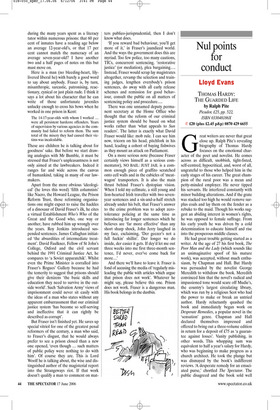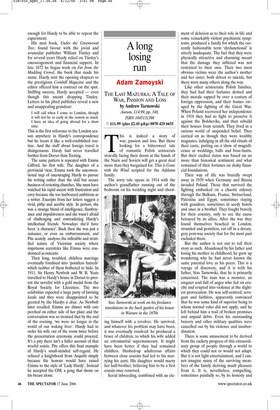Nul points for conduct
Lloyd Evans
THOMAS HARDY: THE GUARDED LIFE by Ralph Pite Picador, £25, pp. 522, ISBN 033048186X ✆ £20 (plus £2.45 p&p) 0870 429 6655 Great writers are never that great close up. Ralph Pite’s revealing biography of Thomas Hardy focuses on the emotional char acter of the poet and novelist. He comes across as difficult, snobbish, tight-fisted, self-centred, hypocritical, and, worst of all, ungrateful to those who helped him in the early stages of his career. The great champion of the rural poor was a mean and petty-minded employer. He never tipped his servants. He interfered constantly with minor building alterations. And if the grate was stacked too high he would remove surplus coals and lay them on the fender as a rebuke to the maid. Though his works suggest an abiding interest in women’s rights, he was opposed to female suffrage. From his early youth he was driven by a cold determination to educate himself and rise into the prosperous middle classes.
He had great trouble getting started as a writer. At the age of 27 his first book, The Poor Man and the Lady (which sounds like an unimaginative spoof of his mature work), was accepted, without much enthusiasm, by Chapman and Hall. But Hardy was persuaded by the novelist George Meredith to withdraw the book. Meredith convinced him that the novel’s radical and impassioned tone would scare off Mudie’s, the country’s largest circulating library, which was run by a religious Scot who had the power to make or break an untried author. Hardy reluctantly quashed the book and immediately began work on Desperate Remedies, a popular novel in the ‘sensation’ genre. Chapman and Hall declared themselves impressed and offered to bring out a three-volume edition in return for a deposit of £75 as ‘a guarantee against losses’. Vanity publishing, in other words. This whopping sum was equivalent to half a year’s salary for Hardy, who was beginning to make progress as a church architect. He took the plunge but was dismayed by the book’s indifferent reviews. ‘A desperate remedy for an emaciated purse,’ chortled The Spectator. The public disagreed and the book sold well enough for Hardy to be able to repeat the experiment.
His next book, Under the Greenwood Tree, found favour with the jovial and avuncular publisher William Tinsley and for several years Hardy relied on Tinsley’s encouragement and financial support. In late 1872 he began work on Far from the Madding Crowd, the book that made his name. Hardy sent the opening chapters to the prestigious Cornhill Magazine and the editor offered him a contract on the spot. Sniffing success, Hardy accepted — even though this meant dropping Tinsley. Letters to his jilted publisher reveal a new and unappealing grandeur:
I will call when I come to London, though it will not be so early in the season as usual. I have an idea of going abroad for a short time.
This is the first reference to the London season anywhere in Hardy’s correspondence but he treats it like a well-established routine. And the stuff about foreign travel is disingenuous. Hardy had never travelled further from Dorset than Tooting.
The same pattern is repeated with Emma Gifford, his first wife. The daughter of a provincial vicar, Emma took the unconventional step of encouraging Hardy to pursue his writing rather than the dull but secure business of restoring churches. She must have watched his rapid ascent with frustration and envy because she too harboured ambitions as a writer. Excerpts from her letters suggest a vivid, pithy and acerbic style. In person, she was a strange blend of intelligence, flamboyance and impulsiveness and she wasn’t afraid of challenging and contradicting Hardy’s intellectual friends. Nowadays she’d have been ‘a character’. Back then she was just a nuisance, or even an embarrassment, and Pite acutely analyses the inflexible and stratified nature of Victorian society where impetuous eccentrics like Emma were condemned as outcasts.
Their long, troubled, childless marriage eventually fossilised into ‘pointless hatreds’ which neither of them bothered to hide. In 1911, Sir Henry Newbolt and W. B. Yeats travelled to Hardy’s house in Dorset to present the novelist with a gold medal from the Royal Society for Literature. The two celebrities expected a large party of fawning locals and they were disappointed to be greeted by the Hardys à deux. As Newbolt later recalled, Emma ate dinner with cats perched on either side of her plate and the conversation was so strained that by the end of the evening, ‘we were no longer in the world of our waking lives’. Hardy had to order his wife out of the room twice before the presentation ceremony could proceed. It’s a pity there isn’t a fuller account of that woeful soirée. Pite offers this final example of Hardy’s small-minded self-regard. He refused a knighthood from Asquith simply because the honour would have raised Emma to the style of ‘Lady Hardy’. Instead he accepted the OM, a gong that shone on his breast alone.



















































































 Previous page
Previous page